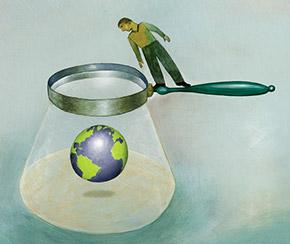 |
It was a big year for the green set. Al Gore won the Nobel Peace Prize. Wal-Mart partnered with the Clinton Climate Initiative. Chances are, you bought an energy-saving light bulb. For Amherst, 2007 marked the official start of the environmental studies major.
The new major, which the faculty approved in November, began with a discussion among professors from nearly a dozen departments. The major will require students to take courses in the humanities, sciences and social sciences. A core introductory course and a senior seminar are team-taught by a scientist and a non-scientist. Off-campus internships will be encouraged.
“You can’t really approach the issues in any meaningful way without taking into consideration policy, ethics, history and economics,” says Tekla Harms, professor of geology, who describes herself as a “midwife” in getting the new major approved. “And then there’s the science part of the equation as well.” The challenge for faculty, she says, will be to explicitly integrate a wide range of scholarship. “You can’t just tell a student to take a geology course, a history course and an economics course and say that’s environmental studies,” she says. “We, the faculty, have to stand with the students and make the connections.”
The impetus for the new major was as much student demand as it was a growing realization that a “cascade of environmental concerns” will put the health of the planet “front and center on agendas of the nations of the world,” explains Jan Dizard, the Charles Hamilton Houston Professor of American Culture (Sociology), who is overseeing the new major. This semester, he and Ethan Clotfelter, assistant professor of biology and neuroscience, are team-teaching the gateway course, The Resilient Earth: An Interdisciplinary Reflection on Contemporary Environmental Issues.
Junior Kathryn Loomis became the first student to declare the new major. “I’m the kind of person who had 10 different things I wanted to major in,” she says. As a child, Loomis always cared about the environment: “I used to donate money to save the tigers and that kind of thing.” She looks forward to spending her last three semesters of college exploring different aspects of the environmental crisis. She envisions a career as a lobbyist or policy analyst.
Many other colleges already have well-established environmental studies programs. “We had the benefits of being late to the game,” Harms says. “We heard over and over that you can’t be all gloom and doom. You have to show students that there is work to be done” and that they can make a difference. That’s why, she says, the internships will be so important.
Harms believes that for today’s college students, the “dominant issue of their time” will be ecological well-being. “I think Al Gore’s Nobel Peace Prize was well earned,” she says, referring to the former vice president’s work to draw attention to global warming. “The good news,” she says of efforts around the world, “is that we’re waking up and we’re figuring it out.”
Image copyright 2008 John S. Dykes c/o theispot.com.